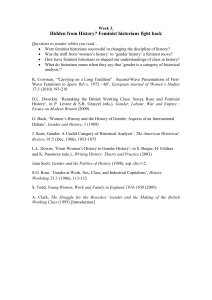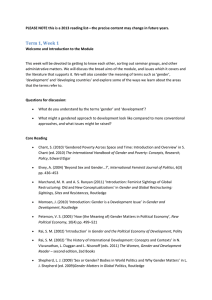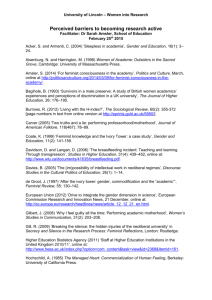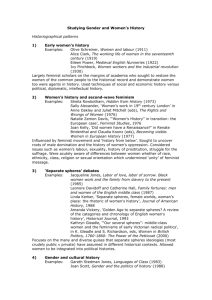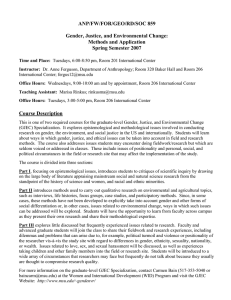PowerPoint - Lancaster University
advertisement
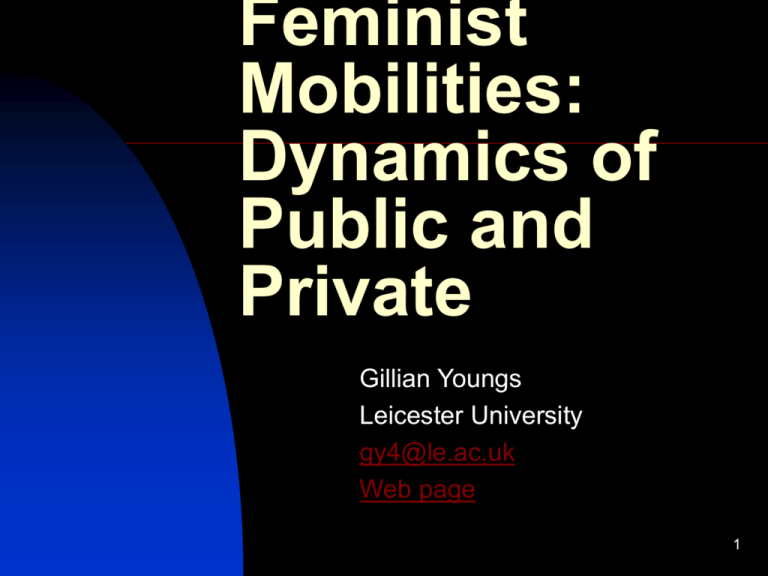
Feminist Mobilities: Dynamics of Public and Private Gillian Youngs Leicester University gy4@le.ac.uk Web page 1 Outline This paper seeks to ‘locate’ the concept of mobility in the context of traditions of feminist theory and practice and their reformulations in relation to ICTs. 2 Its main arguments are rooted in explorations of new forms of virtual materiality and the importance of historical constructions of gendered social space to critical understanding of them. It is based on a number of years of theoretical, practice and policy-related research by the author, including with national and international NGOs and different sections of UNESCO. 3 Gender and ICTs Theory/practice Active/engaged participant observation – Women on the Net Lifelong Learning Lifelong Learning Across the World Network Development Development International Feminist Journal of Politics 4 Key areas: Virtual/Global women’s movement Contextualized meanings of networking Communities and practices Connections, presences and activism Virtual political spheres Identities in process 5 Virtual/Global women’s movement Feminist International Relations Transcendent politics (New spaces, new forums, new processes) APC Women’s Programme WSIS Gender Caucus 6 Contextualized meanings of networking Contrasting meanings of ‘international/global’ Varied importance/role of the ‘local’ Historically embedded limitations on access Importance of established relationships to technologies, including in the area of identities 7 Communities and Practices Role of discourses in relation to inclusion/exclusion Different forms of expertise/knowledge and problems of bridging them Generation of new boundaries of misunderstanding Practices of networking involve discovery of boundaries 8 Connections, presences and activism Diverse forms of ‘being’ in cyberspace Distant/indirect linkages to global networks and forms of activism Fluid communities with multiple (institutional) presences and roles Cyberactivism partly defined in practice 9 Virtual political spheres More than just organizations and their interventions? New political spaces of imagining and creative connection/action? Feminist information flows Global consciousness raising (public and private) The feminist web – an alternative political domain? 10 Identities in process Politics as discovery rather than given Self-defined and time/campaign bound processes Multiple identities (across and within real/virtual worlds) Disruption and fluidity The virtual ‘beyond’ the real 11 Publications 'Cyberspace: The New Feminist Frontier?' in Ross, K. and Byerly, C. (eds). Essays in Feminism and Media. Oxford: Blackwell. In press. Forthcoming, 2004. (co-edited with Eleonore Kofman) Globalization: Theory and Practice. 2nd ed. London: Continuum, 2003 12 Publications 'Closing the Gaps: Women, Communications and Technology.' Development. 45(4), 2002. 'Feminizing Cyberspace: Rethinking Technoagency.' In J. Parpart et al. (eds). Rethinking Empowerment: Gender and Development in a Global/Local World. London: Routledge, 79-94, 2002. 13 Publications 'Questions of Agency and the Internet: A New Way of Learning', in Youngs, G., Ohsako, T. and Medel-Anoneuvo, C. (eds) Creative and Inclusive Strategies for Lifelong Learning: Report of International Roundtable 27-29 November 2000. Hamburg: UNESCO Institute for Education, 2001. 14 Publications 'Theoretical Reflections on Networking in Practice: The Case of Women on the Net' in E. Green and A. Adam (eds) Virtual Gender: Technology, Consumption and Identity. London: Routledge, 2001, 84-99. 15 Publications 'Internet Politics and States' in Kramarae, C. and Spender, D. (eds) Routledge Encyclopedia of Women: Global Women's Issues and Knowledge. London: Routledge, 2000, 1154-6. 16

